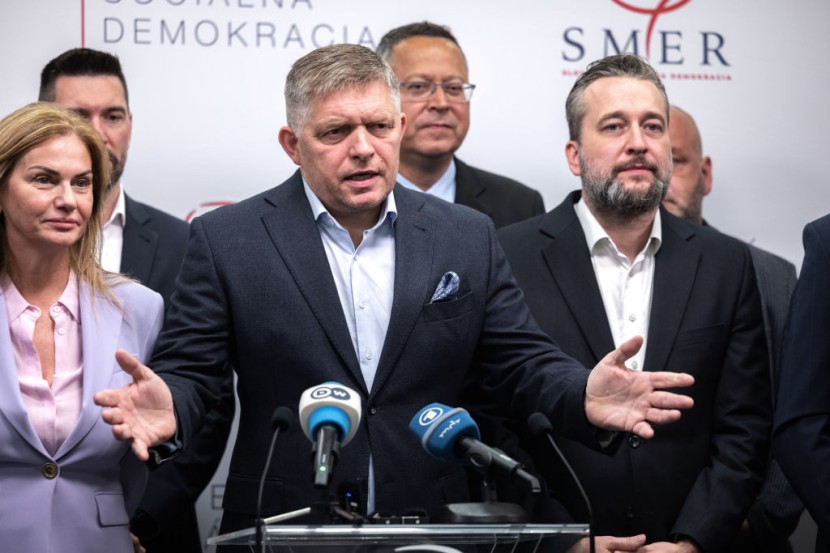
Sunday's election results indicated that the populist party of former prime minister Robert Fico, which opposes military aid to Ukraine and is critical of the European Union and NATO, has won in Slovakia.
The SMER-SSD party received 23.3 percent of the vote, surpassing the centrist Progressive Slovakia (PS) with 17 percent of the vote, the Slovak Statistics Office announced early on Sunday morning after counting 99.98 percent of the votes from approximately 6,000 polling stations.
Pro-Russia Ex-PM Wins Slovakia's Election
The referendum on Saturday was a test of the small Eastern European nation's support for Ukraine in its conflict with Russia. Per CNN, Fico has pledged that Slovakia, one of Europe's largest donors to Ukraine in proportion to its gross domestic product (GDP), will not ship "a single round of ammunition" to Ukraine and has advocated for improved relations with Russia.
After the breakup of Czechoslovakia in 1993, the country of 5.5 million people has been a staunch supporter of Ukraine, donating arms and opening its borders to refugees escaping the conflict since Russia invaded in February.
In the absence of a clear majority, the party with the largest share of the vote will have the first opportunity to form a coalition, while the composition of any government will likely depend on a half-dozen minor parties.
Fico, who served as prime minister from 2006 to 2010 and again from 2012 to 2018, is likely to become prime minister if he can secure the support of the third-place Hlas (Voice) party, which received 14.7% of the vote.
Another prospective coalition partner, the ultranationalist Slovak National Party, which is unambiguously pro-Russian, received 5.6% of the vote.
Robert Fico Vows To Block Ukraine Aid
With seven political parties reaching the 5% threshold needed to enter the parliament, coalition negotiations will almost certainly include multiple players and could be long and messy. While not a landslide, SMER's result is better than expected - last opinion polls published earlier this week showed SMER and PS neck and neck.
According to CNN, Fico also pledged to block Ukraine's NATO ambitions in what would upend Slovakia's staunch support for Ukraine. Michal Šimečka, the leader of PS, said the result was "bad news for the country."
Slovakia's President Zuzana Čaputová said before the election that she would ask the leader of the strongest party to form the government, meaning Fico will get the first stab at forming a government. Šimečka said his party would do "everything it could" to prevent Fico from governing. Meanwhile, Peter Pellegrini, the leader of Hlas, said his party was "very pleased with the result."
Hlas has been vague about its position on Ukraine in the election campaign. Pellegrini has previously suggested Slovakia "had nothing left to donate" to Kyiv but also said that the country should continue to manufacture ammunition that is shipped to Ukraine.
Slovakia, an eastern European nation of about 5.5 million people, was going to the polls to choose its fifth prime minister in four years after seeing a series of shaky coalition governments.
A SMER-led government could have serious consequences for the region. Slovakia is a member of both NATO and the European Union, was among the handful of European countries pushing for tough EU sanctions against Russia and has donated a large amount of military equipment to Ukraine.
But this will likely change under Fico, who has blamed "Ukrainian Nazis and fascists" for provoking Russia's President Vladimir Putin into launching the invasion, repeating the false narrative Putin has used to justify his invasion.
While in opposition, Fico became a close ally of Hungary's Prime Minister Victor Orban, especially when it came to criticism of the European Union.
There is speculation that, if he returns to power, Fico and Orban could gang up together and create obstacles for Brussels. If Poland's governing Law and Justice party manages to win a third term in the Polish parliamentary elections next month, this bloc of EU troublemakers could become even stronger.
Meanwhile, the liberal PS party had been pushing for a completely different future for Slovakia, including continued support for Kyiv and strong links with the West. Fico previously served as Slovakia's prime minister for more than a decade, first between 2006 and 2010 and then again from 2012 to 2018.
He was forced to resign in March 2018 after weeks of mass protests over the murder of investigative journalist Jan Kuciak and his fiancée, Martina Kušnírová. Kuciak reported on corruption among the country's elite, including people directly connected to Fico and his party SMER.
The campaign was marked by concerns over disinformation, with Věra Jourová, the European Commission's top digital affairs official, saying in advance the vote would be a "test case" of how effective social media companies have been in countering Russian propaganda in Slovakia.
Polls suggest Fico's pro-Russia sentiments are shared by many Slovaks. According to a survey by GlobSec, a Bratislava-based security think tank, only 40% of Slovaks believed Russia was responsible for the war in Ukraine, the lowest proportion among the eight central and eastern European and Baltic states GlobSec focused on.
In the Czech Republic, which used to form one country with Slovakia, 71% of people blame Russia for the war. The same research found that 50% of Slovaks perceive the United States - the country's long-term ally - as a security threat.
Related Article : Spanish Conservative Leader Loses First Bid To Become Prime Minister
© 2025 HNGN, All rights reserved. Do not reproduce without permission.








